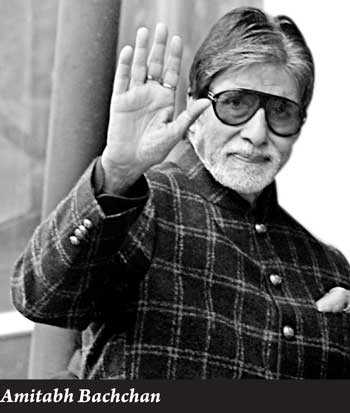Friday Feb 20, 2026
Friday Feb 20, 2026
Saturday, 5 October 2019 00:20 - - {{hitsCtrl.values.hits}}
 Legendary Hindi film actor Amitabh Bachchan will be the latest recipient of India’s celebrated Dadasaheb Phalke Award this year. The annual award honours a distinguished person in the field of cinema for his or her “outstanding contribution to the growth and development of Indian cinema” each year.
Legendary Hindi film actor Amitabh Bachchan will be the latest recipient of India’s celebrated Dadasaheb Phalke Award this year. The annual award honours a distinguished person in the field of cinema for his or her “outstanding contribution to the growth and development of Indian cinema” each year.
India’s Minister of Information and Broadcasting Prakash Javadekar announced on 24 September that Amitabh Bachchan who had entertained and inspired two generations of Indians had been unanimously selected as the Dadasaheb Phalke recipient for 2018 and would receive the award at this year’s Indian National Film Awards event.
Amitabh Bachchan’s immediate response was characteristically modest. The 76-year-old actor tweeted that he was “deeply grateful and most humbled” to have been chosen for the honour. He also said “There is a paucity of words searching a response… for the generosity of words that pour in… I am but deeply grateful and most humbled… my sincerest gratitude.”
 The Dadasaheb Phalke Award comprises a Golden lotus medallion, a shawl and Indian Rs. 1 million in cash. The honour and prestige attached to the award is more important and far greater than the monetary value.
The Dadasaheb Phalke Award comprises a Golden lotus medallion, a shawl and Indian Rs. 1 million in cash. The honour and prestige attached to the award is more important and far greater than the monetary value.
Dadasaheb Phalke is widely regarded as the ‘Father of Indian Cinema’. Dhundiraj Govind Phalke known as Dadasaheb Phalke was the pioneer who produced, directed and wrote the screenplay for India’s first feature film ‘Raja Harischandra’ in 1913. It was made in the Marati language. The Dadasaheb Phalke Lifetime Achievement Award has been in existence since 1969. Interestingly Amitabh Bachchan entered the film industry as an actor in the same year.
Well-deserved award
Amitabh Bachchan receiving the award has delighted millions of his fans all over the world including Sri Lanka. The lanky actor with almost 200 films to his credit has received many awards and honours over the years. These include four national awards. Yet followers of Indian cinema regard the Dadasaheb Phalke Award as being distinctly different from those accolades.
Besides, the kudos linked to the honour ‘rasikas’ of Bachchan known as “The Big B” are elated that the thespian who has given them immense pleasure for many decades has been duly honoured officially by his country. There are many in the cinematic field particularly from the south and east of India who have not been recognised at all despite their immense talent and experience.
Still this does not in any way affect the joy and jubilation caused by the naming of Amitabh Bachchan as Dadasaheb Phalke Award recipient. Those filmgoers who have relished Amitabh Bachchan’s performances in many films will agree that he fully deserves the award.
This writer who has enjoyed Amitabh Bachchan from the time of his early films like ‘Bombay to Goa,’ ‘Zanjeer,’ ‘Abhiman,’ ‘Anand,’ ‘Namakharam,’ ‘Deewar’ and ‘Sholay’ is also of the same opinion. The ‘Spotlight’ column which relates to films, film personalities and film related matters will therefore focus on Amitabh Bachchan in the first of a two-part article this week.
Walking tall for five decades
The six-foot three inch tall Amitabh Bachchan with a deep baritone voice is a towering personality in Hindi cinema. He has been walking tall for five decades as a lead and supporting actor. He has given voice-overs in some films too. Bachchan has also been a playback singer and film producer. The Dadasaheb Phalke Award is the jewel in his crown but Amitabh has won numerous awards at film festivals and from film journals also
India’s reputed film journal in English is the ‘Filmfare’ magazine. Gaining a laurel from ‘Filmfare’ in any category is considered to be a milepost in the career of a film artiste. Amitabh Bachchan has been nominated for 41 acting awards and has won 15 from the magazine.
Apart from cinema-related awards Amitabh Bachchan has also been honoured by the Indian Government with three of the four high civilian awards. He got the ‘Padma Shri’ in 1984, the ‘Padma Bhushan’ in 2001 and the ‘Padma Vibushan’ in 2015 for contributions made to the arts sphere. Only the highest civilian award of all the ‘Bharat Ratna’ awaits him now.
The love and adulation showered on Amitabh by fans is almost unbelievable. In 1982 he was injured while an action scene was being filmed for the film ‘Coolie’. He was hospitalised in a serious condition. Fans in India began conducting thousands of poojas for his recovery in temples. Hundreds of special prayer meetings and devotional ‘Bhajans’ were held. Numerous people observed fasts and rituals. Some rolled on the grounds surrounding places of worship. A temple dedicated to him was constructed.
Amitabh Bachchan was the first living Asian actor whose waxwork model is displayed at the Madame Tussauds in London. A BBC online poll voted him as the Most Popular Actor in the World. He had the honour of carrying the Olympic flame in London. Once when he went to Egypt the fans at Cairo Airport including employees mobbed him. Officials formed a human circle around the actor to protect him from the ecstatic fans. He could not move outside it. Eventually Amitabh was whisked away under police escort to a hotel. Airport and Immigration authorities went to his hotel suite and completed the paperwork formalities.
Amitabh Bachchan dominated Hindi cinema as a superstar from the mid-seventies to the early nineties of the 20th century. So great was his power and influence that the famous French director Francois Truffaut described him once as a “one-man industry”.
Though a septuagenarian now, Amitabh keeps on acting still. The parts he plays now are more in keeping with his age. Many of these roles are varied and challenging unlike the many of the stereo-typed roles he played in his thirties and forties. It appears that he has a wider range of roles now than earlier. In fact he has won three of his four national awards for Best Actor playing elderly roles.
He is 76 and has made a name and earned fame and wealth but still keeps acting. When he was asked about this in a media interview. Amitabh’s response was: “I am insecure about tomorrow. Will I get another job? Will it be appreciated? I will pursue acting for as long as I have a face and body that is acceptable to the people but I still worry that if I don’t do better tomorrow, it will all go away.”
When asked whether acting in films excited him still, Bachchan replied: “I get excited every day: it is wonderful, and it is inexplicable. It would be a horrible day if I was to think, I have done it. It would kill any creativity I possess if I was to be satisfied. Any creative person should never be satisfied with their work.”
Early days
Born in the year 1942, Amitabh Bachchan will celebrate his 77th birthday on 11 October this year. Amitabh’s father Harivansh Rai Shrivastava was a Hindi=speaking Kayastha Hindu from Pratapgarh district in Uttar Pradesh (UP) state in India. His father had a doctorate in English literature from Cambridge University in Britain but was also a renowned Hindi writer and poet.
He used the pseudonym “Bachchan” meaning ‘childlike’ in spoken Hindi. Later he adopted it as his surname. Amitabh’s mother Teji Bachchan was a Punjabi Sikh hailing from Faisalabad in present-day Pakistan. She was very much interested in theatre.
The couple moved to Allahabad where Amitabh and his younger brother Ajitabh were born. Amitabh’s given name at birth was “Inquilaab” meaning revolution in Urdu. Mohandas  Karamchand Gandhi known as “Mahatma (great soul) Gandhi” had launched the ‘Quit India’ freedom campaign against the British colonialists in August 1942. It electrified the political environment of what was then “British India”. Among the slogans and chants popular then was the Urdu “Inquilaab Zindabad” meaning “Long live the revolution”.
Karamchand Gandhi known as “Mahatma (great soul) Gandhi” had launched the ‘Quit India’ freedom campaign against the British colonialists in August 1942. It electrified the political environment of what was then “British India”. Among the slogans and chants popular then was the Urdu “Inquilaab Zindabad” meaning “Long live the revolution”.
Many felt the Indian freedom struggle was a revolutionary process then. The poetic father inspired by the slogan named his son “Inquilaab” (revolution). However after some years the name Inquilaab was changed to Amitabh at the request of another Hindi poet and friend Sumitrananda Pant. Amitabh means “infinite or immeasurable light”. Inquilaab Srivastava became known as Amitabh Bachchan. The family name is now Bachchan.
Amitabh called Amit during childhood had his primary schooling at Allahabad. He was later boarded at Sherwood College in Nainital for his secondary studies. While at Sherwood he acted in school dramas and discovered that he had both a flair as well as passion for acting. His mother encouraged him saying the son should always “take the centre stage”. Amitabh completed his tertiary education at the Kirori Mal College in New Delhi that was affiliated to the Delhi University. He obtained two Masters Degrees in the arts there.
After finishing university Bachchan got a job as executive trainee at the Shaw, Wallace and Hedges firm in the Eastern Indian city of Calcutta now known as Kolkata. He relocated to the West Bengal state capital. Subsequently he shifted to the shipping firm Bird and Co and became a freight broker.
Entry into acting
Even though he was financially well-off with bright prospects, Amitabh found himself restless and discontented. Calcutta was a cultural haven where Bengali plays were staged and films screened daily. Amitabh saw many of them and felt the powerful urge to act. His heart desired to be an actor. After mulling it over for many months he finally decided to act.
Amitabh Bachchan quit his lucrative job in Calcutta and moved to Mumbai known as Bombay then. Bombay dubbed in lighter vein as “Bollywood” is the Hollywood of India. It is a factory of dreams and illusions for those interested in entering the cinema industry. Amitabh Bachchan knocked on the doors of many a film producer and director and film agents. He was rebuffed by all saying he was “too tall and dark”. Exasperated he tried to be a singer and went to an All-India Radio audition. He was rejected.
A thoroughly disappointed and dejected Amitabh was about to bid adieu to Bombay and his dreams when fate intervened benevolently. The famous Bengali Director Mrinal Sen who along with Satyajit Ray and Ritwik Ghatak pioneered the new wave of Indian cinema had embarked on a project to make a film in Hindi. The film was ‘Bhuvan Shome,’ released in May 1969. The film won national awards for Best Film, Best Director and Best Actor. Mrinal Sen gave Amitabh Bachchan a break by getting him to do voiceovers and the narration. Though critics and fans raved over the film, Amitabh Bachchan the narrator went unnoticed. Yet the opportunity to be involved in the film was a morale booster to Bachchan.
‘Saat Hindustani’
Meanwhile the well-known film maker K. A. Abbas (Khwaja Ahamad Abbas) had written the story and screenplay for a film based on the successful Western ‘The Magnificent Seven’ directed by John Sturges. K.A. Abbas “indianised” the film by changing the story.
In the English film seven cowboys led by Yul Brynner help free a terrorised Mexican village from bandits led by Eli Wallach. In Abbas’s Hindi film the story was changed into that of six men and a woman from different regions of India infiltrating Goa ruled by Portugal and hoisting the Indian flag atop liberated Portuguese forts. He named the film ‘Saat Hindustani’ or ‘Seven Indians’ and went on to produce and direct it.
K.A. Abbas selected several actors for the film. One was Utpal Dutt who acted in ‘Bhuvan Shome’ and won Best Actor award. Utpal Dutt suggested the name of Amitabh Bachchan for a role to Abbas. The Director auditioned Amitabh and was impressed. He cast Amitabh Bachchan in the role of Anwar Ali, a Muslim poet from Bihar who recites poetry at times. The film released in November 1969 won two national awards. Amitabh Bachchan’s debut performance was noted by film critics and reviewers.
Among those who acted in the film was the Kerala artiste Madhu who had enacted the role of Paarikkutty in the award-winning Malayalam film ‘Chemmeen,’ directed by Ramu Kariyat. Madhu and Bachchan struck up a close friendship when Abbas’s film was being shot in Maharashtra and Goa. Later Madhu spoke about acting along with Amitabh Bachchan in ‘Saat Hindustani’ in an interview to the ‘Rediff’ website. Here are a few excerpts:
“Several of the seven Hindustanis in the film were newcomers. Amitabh Bachchan was one of them. We shot in Mumbai and Goa for a month. Those days, all of us stayed together in guesthouses like one big family. We were all young and enthusiastic. Though several years have passed by, how can I forget the days when we spent 24 hours a day together and also slept in the same room for more than a month?
“I had noticed Amitabh’s attitude toward work and his willingness to learn. Though it was his first film, he did not give the feeling that he was facing a camera for the first film. I could see an unusual spark in him and a special talent that was waiting to be tapped. But I was more impressed with his voice. Later, I came to know that he had the habit of reciting his father’s verses all the time. That is was what made his voice so attractive. Perhaps he does not know how much those recitations have helped his voice but I am sure that is why his voice is so delightful to ears now.”
Romance
Amitabh began to catch the eye of many directors after Saat Hindustani. One of these was Hrishikesh Mukherjee. He was planning to make the film ‘Guddi’ starring Dharmendra, Utpal Dutt and Jaya Bhaduri a Bengali actress.
Jaya Bhaduri played the schoolgirl Kusum who had a huge crush on the Hindi film star Dharmendra played by Dharmendra himself. Mukherjee thought of casting Amitabh Bachchan in the role of Kusum’s boyfriend Navin. This was endorsed by Utpal Dutt.
Amitabh Bachchan and Jaya Bhaduri met each other for the first time on the sets of ‘Guddi’. They began dating each other and a romance sparked. Amitabh Bachcan was quoted by an Indian magazine saying: “First I saw her pictures, she looked small, cute and impish. Then Hrishikesh approached me for Guddi, and I came to know that Jaya was the actress. I first met her on the sets. We liked each other’s company, went out together and had a good group on the sets.”
When asked what attracted Jaya to Amitabh physically, Jaya coyly replied: “His eyes. But it’s impossible to explain...so many personal things.”
Interestingly enough, Amitabh never got to play the role of Navin Jaya in ‘Guddi’. Hrishokesh Mukherjee replaced him with another for an important reason. However the budding relationship on the sets of ‘Guddi’ bloomed into committed love on the sets of ‘Zanjeer’ and ‘Abhiman’.
Amitabh and Jaya played lovers in one and husband and wife in the other. Zanjeer was released on 11 May 1973. They married on 3 June 1973 and Jaya Bhaduri became Jaya Bachchan. A month later ‘Abhiman’ was released on 27 July 1973.
The year 1973 was a remarkable life-changing year for Amitabh Bachchan. Apart from his marriage to Jaya, Amitabh’s career was on the ascendant thereafter. The tall man with intense eyes and a deep voice went on to become the super star of Hindi cinema.
Next: The angry young man who became Emperor of Hindi cinema
(D.B.S. Jeyaraj can be reached at [email protected].)